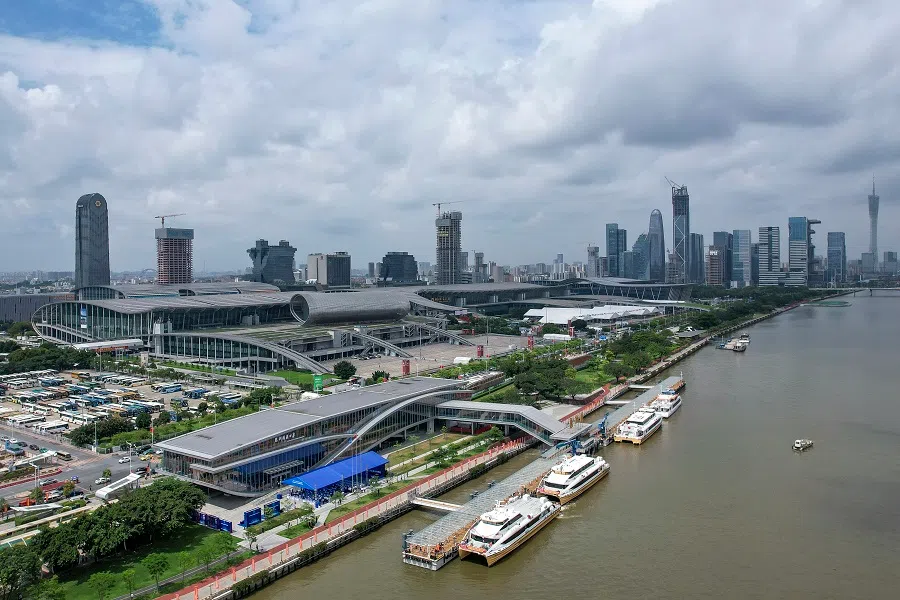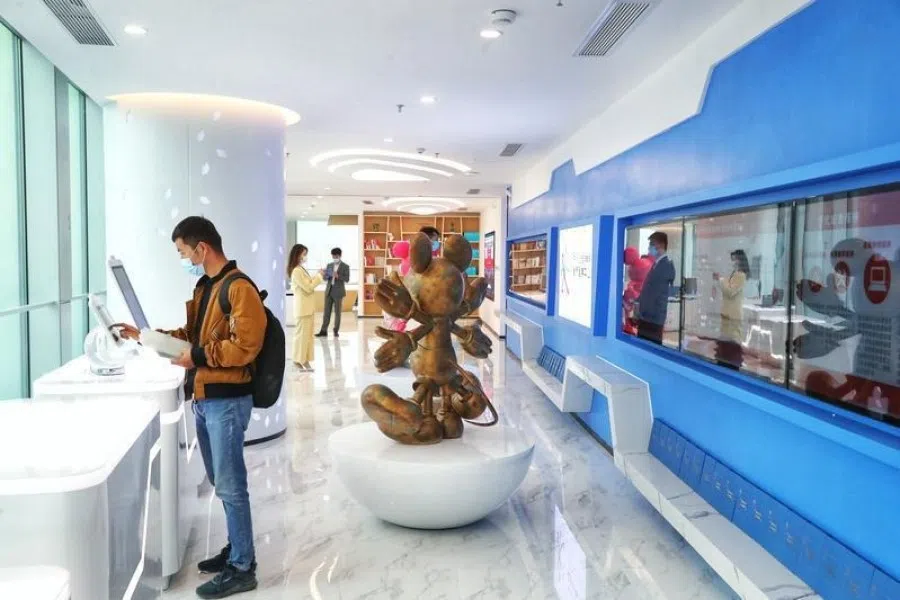Hong Kong youths head to mainland China's GBA to realise entrepreneur dreams
Hong Kong youths are getting a lot of support from the HK government as well as local governments from the Greater Bay Area (GBA) to develop their entrepreneurial potential in the GBA. While it means more opportunities for HK youths to pursue their entrepreneurial dreams, starting a business in an unfamiliar turf is no child's play. Lianhe Zaobao journalist Tai Hing Shing reports from the GBA.

After a hiatus of three years, the borders between Hong Kong and mainland China fully reopened at the start of this year, resuming the movement of people between the two places.
On 5 May, a delegation from the youth-founded Hong Kong Youth Alliance (HKYA) made a three-day visit to Dongguan city in Guangdong for an exchange with mainland youths.
The HKYA delegation comprised 26 youths averaging 28 years old, working in fields including finance, IT, engineering and accountancy in Hong Kong. During their short visit, the delegation attended a forum with representatives from the municipal government and visited local enterprises, such as the Big Cap Creative Park at Shipai (石排大帽子文创园) and designer toy companies, for a closer look at the opportunities they could reap as the Greater Bay Area (GBA) develops.
GBA more conducive for young HK entrepreneurs?
HKYA president Wong Kuok Sang told Lianhe Zaobao that this was the first visit to Dongguan for nearly 80% of the delegation. At the end of the trip, quite a number of them expressed interest in starting their own companies or furthering their careers in the GBA.
... the mainland and Hong Kong SAR governments came up with a series of preferential policies over the last few years to encourage Hong Kong youths to relocate and start businesses in mainland China.

Wong also said, "The cost of starting a business in Hong Kong is very high and it is often difficult for entrepreneurs to make a comeback if they fail. But according to the Dongguan officials we met, the mainland is a conducive place for Hong Kong youths to strike out as there are preferential government policies for rental and accommodation. That is why many of our members who went on the trip are now keen on moving there to start businesses."
In 2019, the unprecedented anti-extradition bill protest broke out in Hong Kong and lasted more than half a year. While it reflects the deep discontent among the Hong Kong people, the incident also exposed the problem of insufficient upward social mobility for its youths. Consequently, the mainland and Hong Kong SAR governments came up with a series of preferential policies over the last few years to encourage Hong Kong youths to relocate and start businesses in mainland China.
Attractive schemes and financing
In neighbouring Guangdong for instance, the provincial government rolled out the Measures to Support Hong Kong and Macau Youth Entrepreneurs in the Guangdong-Hong Kong-Macau Greater Bay Area (《支持港澳青年在粤港澳大湾区就业创业的实施细则》) in May 2022. Start-ups founded by Hong Kong and Macau youth entrepreneurs in Guangdong qualify for a one-off subsidy of 10,000 RMB (US$1,415) per entrepreneur six months after their businesses have been registered and provided that they are still in operation. The entrepreneurs can also apply for annual rental subsidies of up to 6,000 RMB, for a maximum of three years.
Hong Kong and Macau youth entrepreneurs in the GBA who face difficulties in funding their start-ups can also access secured loans for entrepreneurs. The loan is capped at 500,000 RMB for individual entrepreneurs, while those in partnerships can borrow up to 3 million RMB, and up to 300,000 RMB per co-founder.
On the Hong Kong side, the Youth Development Commission of the SAR government has launched two new initiatives, the Entrepreneurship Scheme and the Experiential Scheme, which are aimed at providing better financial support for Hong Kong youth entrepreneurs looking to start businesses in mainland cities in the GBA.
... since the inception of the Entrepreneurship Scheme, around HK$130 million has been disbursed to 16 organisations for the successful formation of 217 youth entrepreneurship teams.

Under the Entrepreneurship Scheme, each team of youth entrepreneurs can receive capital funding of up to HK$600,000 (USD$76,600) for up to three years. Meanwhile, the Experiential Scheme aims to provide youth entrepreneurs with a better idea of what it is like to start a business in the mainland through short-term events and activities such as start-up competitions, as well as opportunities to learn more about the entrepreneurial environment and operating models of the GBA innovation and entrepreneurial bases.
Encouraging responses from HK youths
In early April, the Hong Kong Home and Youth Affairs Bureau submitted a document to the Hong Kong SAR Legislative Council, revealing that since the inception of the Entrepreneurship Scheme, around HK$130 million has been disbursed to 16 organisations for the successful formation of 217 youth entrepreneurship teams. These teams have gone on to launch start-ups in areas such as R&D and innovation, retail, IT, healthcare, product design and educational services.
Meanwhile, around HK$5 million has been spent on short-term experiential activities organised by 15 non-governmental organisations in mainland cities in the GBA under the Experiential Scheme.
... more than 70% of the respondents were willing to work or start businesses in the region.
With the joint backing of the mainland and Hong Kong SAR governments, Hong Kong youths heading to Guangdong to embark on their entrepreneurial journeys is becoming a growing trend. In early May, a survey conducted by the Hong Kong United Youth Association on the opinions of Hong Kong youths towards living and working in mainland cities in the GBA showed that more than 70% of the respondents were willing to work or start businesses in the region.
In April, the Hong Kong Youth and Professional Network and the Hong Kong Federation of Youth Groups carried out an online survey with 961 residents, of which more than 70% were between the ages of 18 and 40 years old. The published findings indicated that 65.5% of those surveyed agreed that the GBA brought new opportunities to their career development, while 71.3% of the respondents indicated their willingness to work or further their careers in the mainland.
Young musician sets up shop in Shenzhen
Ding Ching Hoi is an example of a Hong Kong youth who started a business in the mainland. The 27-year-old set up his music studio, Livehouse, at a cultural innovation park in Longgang district, Shenzhen, in November 2020.
From a young age, Ding was greatly influenced by his mother's love for singing, and he started singing and piano lessons in primary two, and was already composing music at 12 years old. Six years ago, he formed a band with two friends, marking the start of his career as a musician.
"I feel that the GBA is an opportunity that Hong Kong youths should seize. In fact, I would say that it is probably the best avenue they can find in the whole world to make something of themselves." - Ding Ching Hoi, musician and owner of music studio Livehouse
Like many other youth bands, Ding's band started out with ballads, hip-hop and rock music. They participated in performances of various scales in Hong Kong, but the small size of the local market meant that their prospects were unremarkable. After the mainland and SAR governments rolled out various GBA development plans and policies, Ding decided to relocate to the mainland for further development.

Ding told Zaobao that real estate and finance account for a big part of economic activities in Hong Kong, so local youths have very few remaining opportunities to develop. He said, "I feel that the GBA is an opportunity that Hong Kong youths should seize. In fact, I would say that it is probably the best avenue they can find in the whole world to make something of themselves."
Using his music studio in Shenzhen as an example, Ding shared that he has access to 700 to 800 square metres of space, where his band can record videos, do photo shoots, perform and rehearse. He said, "There are few working spaces left for bands in Hong Kong, but such large spaces for our music activities are still possible to find in Shenzhen."
Ding went on to say that back in Hong Kong, he was mostly only involved in songwriting and performing. But in Shenzhen, he went beyond producing music to managing various aspects of Livehouse, such as equipment, operations and video production. This allowed him to make professional breakthroughs and become more versatile.
Ding agreed that the mainland's pro-entrepreneurship policies are also a draw for Hong Kong youths. When he was setting up Livehouse, government departments such as the Communist Youth League Shenzhen Committee and the Shenzhen Youth Federation provided policy guidance and support through many outreach talks. "They gave entrepreneurs like us a better understanding of mainland government policies and access to information," he said.

Ding added, "As a youth with an average family background, I felt that I might not have enough funds to start a business in Hong Kong. Besides, my parents are not business owners, so it may not work out for me. But the situation is completely different in the mainland. There is plenty of governmental support, and the impossible often becomes possible as a result."
In the past two years, Ding spent very little time in the mainland due to the pandemic. But as Hong Kong and Shenzhen return to normalcy this year, he is making frequent trips between the two places again. He currently spends about half his time in Shenzhen to advance his career.
... a few years ago, Hong Kong youths generally had an unfavourable view of the mainland, but they have recently begun to accept the idea of furthering their careers there. - Louis Chen, secretary-general of the Hong Kong Legal Exchange Foundation
One-stop shop for innovation and entrepreneurship services
The Shenzhen North Station Centre for Hong Kong and Macau Youth Innovation and Entrepreneurship was set up by the municipal government of Longhua district in Shenzhen. Since its opening in 2021, the 5,000-square-metre centre has provided one-stop services for government policy consultations, entrepreneurship guidance, government services, venture capital services and more, to Hong Kong and Macau youths.
Louis Chen, secretary-general of the Hong Kong Legal Exchange Foundation and legal consultant at the service centre, told Zaobao that since its opening, the centre has hosted more than 200 visits for Hong Kong and Macau youth entrepreneurs based in eight cities in the GBA. It also received over 180 entry applications from Hong Kong and Macau youth entrepreneur teams and enterprises, with 242 youths from 46 teams successfully qualifying for a space at the centre. The centre's current occupancy rate is more than 90%.
Chen also observed that a few years ago, Hong Kong youths generally had an unfavourable view of the mainland, but they have recently begun to accept the idea of furthering their careers there. Since travel between Hong Kong and the mainland returned to normal, he has also received an increasing number of enquiries from Hong Kong youths regarding opportunities for career development in mainland cities in the GBA.

Chen feels that the homogeneity of Hong Kong's economic activities means that many local youths lack opportunities to showcase their talents and dreams. He recommended that Hong Kong youths consider starting a business in the mainland if their circumstances permit. He also pointed out that mainland China's rapidly growing economy and huge market provide big opportunities for start-ups and entrepreneurs, thus giving Hong Kong youths more space and avenues for development.
The mainland government has been pushing for greater connectivity between Hong Kong, Macau and the mainland. Through enhancing cooperation and exchange among the three places, it has provided Hong Kong youths with more policy and institutional benefits to start businesses in the mainland.
Strengths and potential of Hong Kong youths
Chen said, "Aside from their excellent educational backgrounds and professional abilities, Hong Kong youths are nimble and have distinctive strengths and potential as entrepreneurs in the mainland."
Terry Yip, senior lecturer at the Education University of Hong Kong, told Zaobao that the flourishing of the GBA in recent times is a massive opportunity for Hong Kong youths. For instance, according to the Global Startup Ecosystem Index 2022 report by global start-up research centre Startup Blink, Shenzhen ranked 18th among cities worldwide for its startup ecosystem, while Hong Kong only came in 36th. Clearly, neighbouring Shenzhen has a more favourable start-up ecosystem than Hong Kong.
However, it is also noteworthy that economic development in mainland China has slowed due to the impact of the pandemic. Yip agreed that the mainland is currently still recovering from the pandemic, so trying to start a business there has become more challenging. Hong Kong youth entrepreneurs should be wary that they still need sufficient capital, patience and determination to pull through in the mainland.
... the unfamiliarity with the local environment and people is a greater issue for Hong Kong youths compared with mainland youths.

Yip pointed out, "Aside from teaching our youths how to become entrepreneurs and managers, the government also needs to teach them how to cope with failures, because a good number of them will fail in their entrepreneurship journeys and they would need to cultivate resilience to deal with adversity."
Furthermore, the unfamiliarity with the local environment and people is a greater issue for Hong Kong youths compared with mainland youths. Yip feels that the mainland and SAR governments can alleviate this by helping Hong Kong youths be better prepared before they venture into the GBA. For example, sharing sessions by experienced entrepreneurs can be organised to help these youths make better plans before striking out.
Shenzhen North Station Centre's Chen started his own company in Guangdong several years ago. Considering the institutional and environmental differences between Hong Kong and mainland China, Chen advised potential Hong Kong youth entrepreneurs to understand the local government policies and regulations, especially in terms of financing, personnel management and intellectual property rights, to ensure that their start-ups stay on the right side of the law.
Additionally, these youths also need to understand the mainland market. Chen said that the mainland market is totally new to many Hong Kong youths, so they need to have a good understanding of market needs and the competition before they can produce the appropriate marketing and branding strategies. He advised, "In this aspect, the Hong Kong youths can partner with established mainland companies or start-up incubators to access market insights and resources."
This article was first published in Lianhe Zaobao as "香港特稿:陆港政府大力支持 港青赴粤创业成风".





